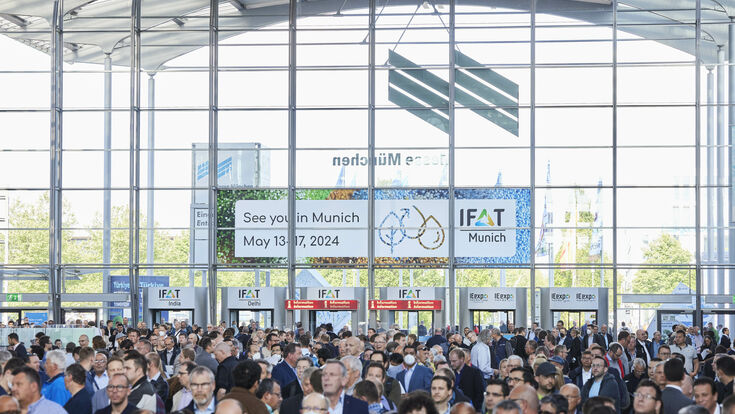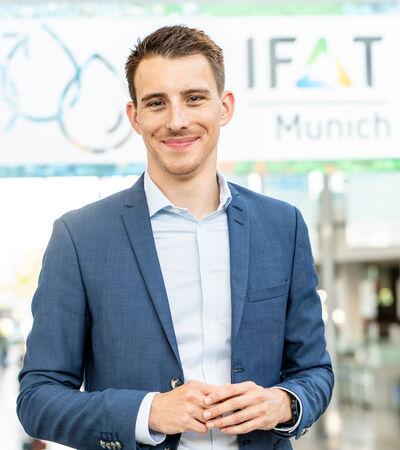IFAT 2024 : “Sustainability and environmental protection are a cross-industry task”

How has IFAT evolved over the years?
Over the years, IFAT Munich has become increasingly versatile and comprehensive. But it is important for us that we have two clear focal points: Water and wastewater, and recycling and the circular economy. Of course, a lot is changing within these areas. We are seeing new processes being added and trends that are developing further. Keywords such as digitalisation and artificial intelligence are now playing a significant role, as are new forms of energy such as hydrogen. Our exhibitors are now presenting vehicles that run on hydrogen or technologies that produce hydrogen from wastewater. These are trends that we also want to give space to, and so IFAT continues to develop from within. But we also know what we want to be and where the clear boundaries are.
What are some key highlights or themes of IFAT Munich that attendees can expect to see?
This year, we have a Blue, Orange and Green Stage as highlights of the event programme. Associations, partners, companies and ministries will be involved here with presentations, panel discussions and expert panels. In addition, IFAT Munich will once again offer "technologies to experience": our live demos in the outdoor area or the competitions in the atrium will show people and machines in action.
Cross-industry sessions are new this year. How did they come about and why are they important?
Sustainability and environmental protection are a cross-industry task that encompasses all areas of society. With the IFAT Munich cross-industry sessions, we bring together a wide range of industries to discuss and find joint solutions to the major challenges of our time, such as the scarcity of natural resources, waste and pollution.

Even though IFAT started out as a conference for waste pollution research, the waste management sector was soon included in the programme. What are the challenges this industry currently faces and what solutions are there?
The successful path to a circular economy that works in the long term can only be achieved through optimization at all stages of the value chain – starting with product design, then moving on to production and use, and the recycling process. In addition to technical, regulatory, and organizational measures, that also implies the need to change behaviors. Among the main keywords in this context are design for recycling, recycling labels, digital product passports and watermarks, chemical trackers, building information modeling, and quota and monitoring solutions. Visitors to IFAT Munich will be able to get a good overview of these solutions.
How does IFAT facilitate networking and collaboration among professionals in the environmental technology industry
Networking and knowledge transfer are essential for IFAT Munich. That is why we place particular emphasis on versatility and interaction when designing the event programme. In addition to the cross-industry sessions, we offer our visitors e.g. Spotlight Areas with in-depth insights into current topics, technologies or material flows. We also expect a good response to our guided solution tours which will steer straight to the stands that offer the best overview of specific issues.
Can you discuss any notable trends or developments that have emerged from previous editions of IFAT Munich?
IFAT is very dynamic and changes every time. We react to technical innovations, but also to changes in the political framework and constantly adapt our key themes. Of course, we also always evaluate which formats and topics interest our visitors and exhibitors and what they want. The Cross-Industry Sessions, for example, which we are organising for the first time this year, are the result of this exchange.
This year’s key topic is: Adapting to the results of climate change. We discuss the special role of communities on the path to better climate resilience and the valuable contribution waste management makes to protecting the climate.
How has IFAT Munich adapted to the changing landscape of environmental challenges and technological advancements over the years?
IFAT Munich always has its finger on the pulse because we adapt our key themes to current problems. This year’s key topic is: Adapting to the results of climate change. We discuss the special role of communities on the path to better climate resilience and the valuable contribution waste management makes to protecting the climate.
Will the event’s sessions also be available online or on demand later?
We want to bring people together live at the trade fair, so we have not planned any recordings.
Sustainability is at the core of this event. How does the organisation, the location implement this principle?
Messe München has set itself the goal of becoming completely CO2-neutral by 2030 and has already introduced a number of measures to achieve this. For example, we switched to completely renewable electricity at the beginning of 2020 and operate one of the world's largest photovoltaic systems on our hall roofs. Furthermore in cooperation with CIRCULAZE Messe München has launched an impact initiative focusing on the circular economy: bgreen leaders. This cross-industry sustainability network aims to offer companies, start-ups and investors a networking and collaboration platform to present their initiatives in the field of environmental sustainability and thus initiate change.

